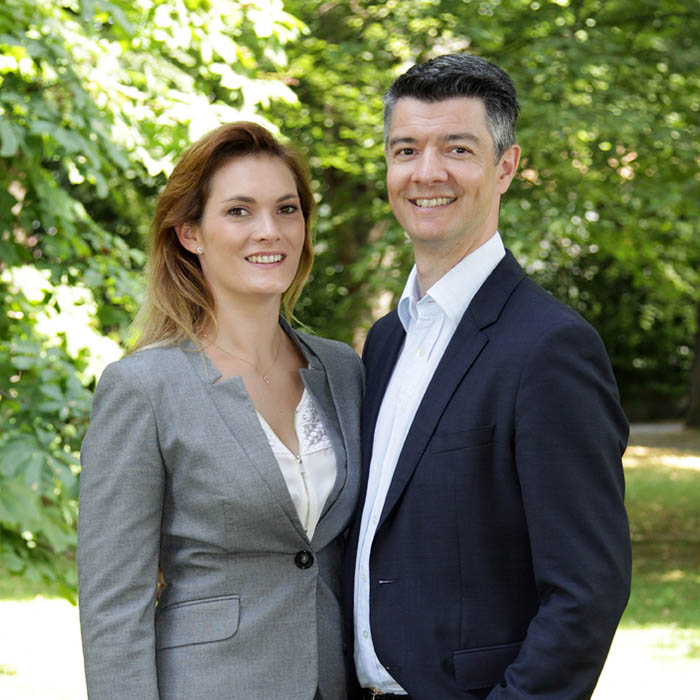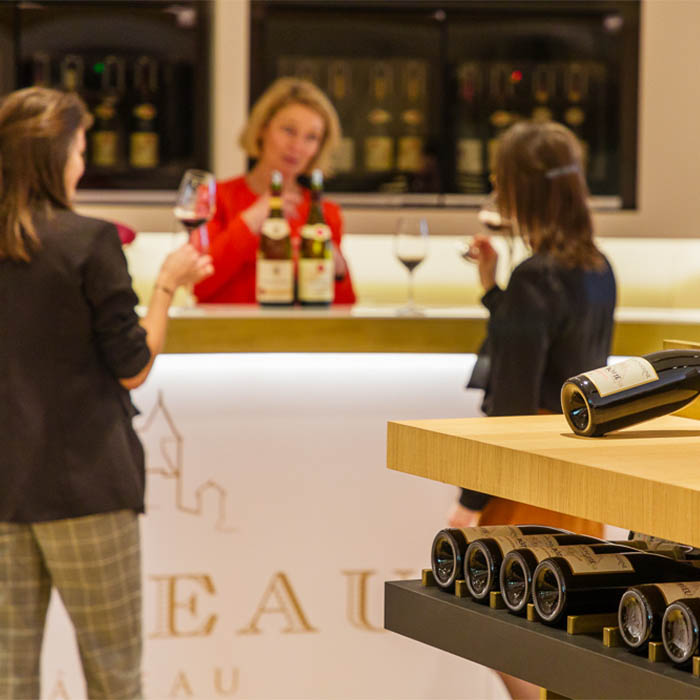 Stéphane Chalaye Photography for E.Guigal
Stéphane Chalaye Photography for E.GuigalPhilippe Guigal, you are at the head of Maison Guigal located in Ampuis at the foot of the Côte-Rôtie vineyards, with your father Marcel, and your wife, Eve, in marketing. What innovations have you introduced recently? In the vineyard first.
Philippe Guigal: Sometimes we can find our future by looking to the past. Côte-Rôtie is a vineyard with steep terraced slopes. The walls that support these terraces date for the most part from Roman times. This is our heritage, to be preserved. At the same time, terraces are needed to work the vines. At present, we are adapting our terraces to so-called modern viticulture, which takes into account organic farming in particular. We are HVE level 3 (High Environmental Value) and it is not as simple as it seems. It's a question of will, equipment and people. In Côte-Rôtie, we unfortunately don't have any equipment in this context of steep slopes: mechanisation doesn't exist. The equipment is therefore mainly the men. With aids... like winches. When we redo the walls of the terraces, we always imagine how to winch between two vines: on a caterpillar, via a tractor? A whole historic part of Côte-Rôtie cannot be winched, like Côte Blonde or La Mouline. There, you have to get out... the bigod. This is a tool that dates back to antiquity: a kind of pickaxe with two teeth. With this you can do everything: weeding, clearing... All the work on the soil is done by hand, with sweat. This bigod can be seen in our museum in the castle cellar. Nevertheless, two years ago, we were able to evolve in terms of equipment, thanks to a world exclusivity with Unimog: extreme vehicles, in the agricultural range. We can now carry 4 tons of grapes up 45 degree slopes. All the German safety features are then at our service: anti-skid, 4 wheels that turn at the same time.
Has the Côte Rôtie vineyard reached its maximum size?
Philippe Guigal: The Côte-Rôtie appellation is now 330 ha, and the potential for planting is 340 ha or even 350 ha, depending on the rocks, the classified wooded areas or the European network to preserve biodiversity, Natura 2000. We had a lot of fallow land. We are working on the development of different terroirs, which are extremely well placed. In particular, we have an exceptional cru next to the Côte Brune, called La Reynarde, which could well be our fourth cru after La Mouline, La Turque and La Landonne. If all goes well, we should have our first vintage in 2022, and then the maturation, which would make a release in 2026. We also have new plantings: Nève, and the impressive La Chapuise, in Saint Cyr Sur Rhône, in the north of the appellation. These are cooler, later terroirs. With global warming, it makes sense to diversify.
And collectively, what innovations in the vineyard are the winegrowers of the appellation working on?
Philippe Guigal: The appellation is investing in drones for organic treatments. Côte-Rôtie is part of the national experimentation centre. The idea is to be very targeted and to move from traditional viticulture to precision viticulture. We have set up a weather service network with dedicated stations. The vineyard managers are equipped with an application that gives them the precise local weather. These weather models make it possible to predict the development of vine diseases: oidium, mildew, black rot, etc., and thus adjust treatments. This is a major ongoing R&D project, carried out by everyone in the appellation.
In your cellar, have you introduced any new features?
Philippe Guigal: Our winery is like Côte-Rôtie: both traditional and modern. For our vinification, we have stainless steel vats, thermo-regulated, which I am very attached to. This material is neutral and very clean. Although Maison Guigal has grown a lot and with wines coming from all over the Rhône Valley in quantity, we vinify exclusively with indigenous yeasts. For the ageing, we have 5,000 barrels. The most important thing with these barrels is their cleanliness. We are therefore extremely vigilant about cleaning them. We were pioneers in using the technology of a Swiss supplier, a specialist in the cleaning of wine containers called Moog. After 2 years of R&D with them, we created a washing station with 5 tanks at the same time, with steam, ozone, drying... Moreover, we have our own cooperage. We have refined the precision of our barrels: some are now adapted to the maturing of red wines and others to white wines. This summer, we plan to optimise the robotic boxing and deboxing area in order to double our production capacity, so as to better satisfy our customers.
I want to leave my children a company that is anchored in the 21st century.
Do you think about sustainable development in the cellar, too?
Philippe Guigal: Of course! For example, we sort our waste produced in the cellar or during bottling. We now have plastic compactors. We have changed all our lighting to low consumption. We also have a specific approach to our wine-making sludge, with treatment by filtration. We filter our wastewater to ensure that the water discharged into the sewer system is as clean as possible. These are very technical issues that are crucial for us. In addition, we implemented beehives in order to participate in biodiversity, 7 years ago. It was my wife Eve who became a beekeeper, helped by our gardener. We have the chance to eat our own honey. And we also benefit from the olive oil from the Château de Nalys. We do all this because it has to be done. I want to leave my children a company that is anchored in the 21st century. We have to think about the planet, especially if solutions exist.
And how does this translate into the marketing of your wines?
Philippe Guigal: Through these examples of sustainable development, I hope you can see that we are very interested in it. However, I find green-washing or bio-marketing unbearable. For me, bio is above all an argument that concerns technical projects. This subject will become a non-issue: tomorrow, all winegrowers will have to be organic, it will just become the norm. I want people to buy Guigal wine because it is good, above all, because there is a tradition, a know-how. We owe our consumers a wine produced in an environmentally friendly way. My name is written on my wines, Guigal, it's a commitment.
What's new?
Eve Guigal: On Côte-Rôtie, our packaging remains very classic. But we have tried to renew our Côtes-du-Rône rosé. The label has become lighter, more pink, more "girly". This bottle has been reworked: full, it is white, and empty, we see its striated structure inside appear. It's a little fantasy. A project that took us two years to set up. We are not the kings of marketing, but we are getting results. For example, thanks to this change in packaging, we have multiplied the sales volumes of this wine by 4. People are very sensitive to this kind of thing for rosé.
 Stéphane Chalaye Photography for E.Guigal
Stéphane Chalaye Photography for E.GuigalHow did the launch of the Caveau du Château, your wine tourism space, go?
Eve Guigal: In January 2020, we opened a sales and tasting cellar in Ampuis, to welcome wine tourists from all over the world. And then we had to close in March, for the first containment. Then we used the possibility in France that the priority businesses had to remain open. When we look back, we are satisfied. In the first year, we had a very good summer, and the French people were there. In particular, the terrace was a great success: during a pandemic, people don't have the stress of being indoors. In 2021, we have doubled our turnover. Thanks to small events, as well as the seminar space on the first floor. We also hired a great team of wine enthusiasts who love to share. It's a space that links the world of wine, the world of tasting and selling wine with this heritage aspect.
A heritage that is omnipresent from the vine to the glass?
Philippe Guigal: For us, heritage and culture are important. To fully understand Côte-Rôtie, you have to understand the past. You appreciate the wine even more when you know how much effort it takes to produce it. Côte-Rôtie is rare and expensive. Its price has risen very quickly in recent years. On the price, we are following because we release our vintages last because of our long maturing policy (3 years). We are in line with the commercial policies of our colleagues. We know how to justify the 40-45 euros per bottle of Côte-Rôtie. There is a lot of work behind each bottle. All the more so by going organic. On Côte-Rôtie, we are condemned to excellence, to great tables, to great wine lovers.